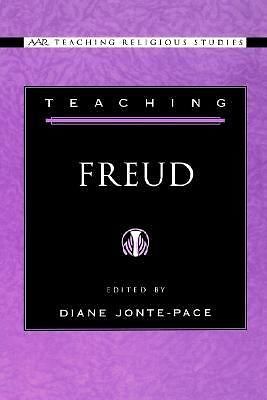- Author
- Jonte-Pace, Diane, ed.
- Publisher
- Oxford University Press, New York, NY
AAR Teaching Religious Studies Series (Oxford University Press)
One of the central questions of the field of Religious Studies is "What is religion and how might we best understand it?" Sigmund Freud was surely a paradigmatic cartographer of this terrain. Among the first theorists to explore the unconscious fantasies, fears, and desires underlying religious ideas and practices, Freud can be considered one of the founders of the field. Yet Freud's legacy is deeply contested. With his reputation at perhaps its lowest point since he came to public attention a century ago, students often assume that Freud is sexist, dangerous, passe, and irrelevant to the study of religion. How can Freud be taught in this climate of critique and controversy? The fourteen contributors to this volume, all recognized scholars of religion and psychoanalysis, describe how they address Freud's contested legacy by "teaching the debates." They describe their courses on Freud and religion, their innovative pedagogical practices, and the creative ways they work with resistance.
Part I focuses on institutional and curricular contexts: contributors describe how they teach Freud at a Catholic and Jesuit undergraduate institution, a liberal seminary, and a large multicultural university. In Part II contributors describe courses structured around psychoanalytic interpretations of religious figures and phenomena: Ramakrishna, Jesus and Augustine, myth and mysticism. Part III focuses explicitly on courses structured around major debates over gender, Judaism, anti-Semitism, religion, and ritual. Part IV describes courses in which psychoanalysis is presented as a powerful pedagogy of transformation and insight. (From the Publisher)
One of the central questions of the field of Religious Studies is "What is religion and how might we best understand it?" Sigmund Freud was surely a paradigmatic cartographer of this terrain. Among the first theorists to explore the unconscious fantasies, fears, and desires underlying religious ideas and practices, Freud can be considered one of the founders of the field. Yet Freud's legacy is deeply contested. With his reputation at perhaps its lowest point since he came to public attention a century ago, students often assume that Freud is sexist, dangerous, passe, and irrelevant to the study of religion. How can Freud be taught in this climate of critique and controversy? The fourteen contributors to this volume, all recognized scholars of religion and psychoanalysis, describe how they address Freud's contested legacy by "teaching the debates." They describe their courses on Freud and religion, their innovative pedagogical practices, and the creative ways they work with resistance.
Part I focuses on institutional and curricular contexts: contributors describe how they teach Freud at a Catholic and Jesuit undergraduate institution, a liberal seminary, and a large multicultural university. In Part II contributors describe courses structured around psychoanalytic interpretations of religious figures and phenomena: Ramakrishna, Jesus and Augustine, myth and mysticism. Part III focuses explicitly on courses structured around major debates over gender, Judaism, anti-Semitism, religion, and ritual. Part IV describes courses in which psychoanalysis is presented as a powerful pedagogy of transformation and insight. (From the Publisher)
